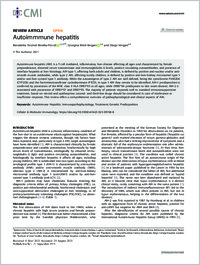Autoimmmune hepatitis
- Terziroli Beretta-Piccoli, Benedetta Epatocentro Ticino, Lugano, Switzerland - Institute for Research in Biomedicine (IRB), Faculty of Biomedical Sciences, Università della Svizzera italiana, Switzerland - King’s College London Faculty of Life Sciences &, Medicine At King’s College Hospital, London, UK
- Mieli Vergani, Giorgina King’s College London Faculty of Life Sciences &, Medicine At King’s College Hospital, London, UK - Paediatric Liver, GI and Nutrition Centre, MowatLabs, King’s College Hospital, London, UK
- Vergani, Diego King’s College London Faculty of Life Sciences &, Medicine At King’s College Hospital, London, UK - Institute of Liver Studies, MowatLabs, King’s College Hospital, London, UK
-
27.09.2021
Published in:
- Cellular & molecular immunology. - Springer. - 2022, vol. 19, p. 158–176
English
Autoimmune hepatitis (AIH) is a T-cell mediated, inflammatory liver disease affecting all ages and characterized by female preponderance, elevated serum transaminase and immunoglobulin G levels, positive circulating autoantibodies, and presence of interface hepatitis at liver histology. AIH type 1, affecting both adults and children, is defined by positive anti- nuclear and/or antismooth muscle antibodies, while type 2 AIH, affecting mostly children, is defined by positive anti-liver- kidney microsomal type 1 and/or anti-liver cytosol type 1 antibody. While the autoantigens of type 2 AIH are well defined, being the cytochrome P4502D6 (CYP2D6) and the formiminotransferase cyclodeaminase (FTCD), in type 1 AIH they remain to be identified. AIH-1 predisposition is conferred by possession of the MHC class II HLA DRB1*03 at all ages, while DRB1*04 predisposes to late onset disease; AIH-2 is associated with possession of DRB1*07 and DRB1*03. The majority of patients responds well to standard immunosuppressive treatment, based on steroid and azathioprine; second- and third-line drugs should be considered in case of intolerance or insufficient response. This review offers a comprehensive overview of pathophysiological and clinical aspects of AIH.
- Language
-
- English
- Classification
- Medicine
- License
- Open access status
- hybrid
- Identifiers
-
- RERO DOC 333715
- DOI 10.1038/s41423-021-00768-8
- ARK ark:/12658/srd1319292
- Persistent URL
- https://n2t.net/ark:/12658/srd1319292
Statistics
Document views: 255
File downloads:
- Texte intégral: 421
